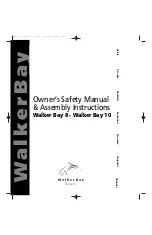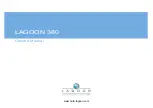
OS 235
30
SPILLED FUEL CAN CAUSE A FIRE OR AN EXPLOSION. MAKE SURE YOU DO NOT
SPILL ANY FUEL. IF A SMALL AMOUNT OF FUEL IS SPILLED ON THE FIBERGLASS,
USE A CLOTH TO REMOVE THE FUEL AND PROPERLY DISPOSE OF THE CONTAMI-
NATED CLOTH. IF FUEL IS SPILLED ON THE WATER, EXERCISE EXTREME CAUTION.
FUEL FLOATS ON THE SURFACE OF THE WATER AND CAN IGNITE. IF FUEL IS
SPILLED INTO THE WATER, IMMEDIATELY EVACUATE THE AREA AND NOTIFY THE
MARINA AND THE PROPER OFFICIALS.
9.
Remove the nozzle.
10.
Install and tighten the fuel cap. Be careful not to overtighten the cap.
11.
Check the fuel compartment and below the deck for fuel odors. If you smell
fuel, do not start the engine.
TO REDUCE THE RISK OF A FIRE AND/OR EXPLOSION, DO NOT START THE ENGINE(S)
WHEN FUEL FUMES ARE PRESENT. FUEL FUMES ARE DANGEROUS AND HARMFUL
TO YOUR HEALTH. MAKE SURE ALL GASOLINE ODORS ARE INVESTIGATED IMME-
DIATELY.
3.4 Fuel System Maintenance
PERIODICALLY INSPECT ALL PRIMER BULBS, CONNECTIONS, CLAMPS AND HOSES
FOR LEAKAGE AND DAMAGE OR DETERIORATION. REPLACE AS NECESSARY.
Spray the valves, tank fuel gauge sender and ground connections with a metal protector.
Frequently inspect and lubricate the fuel fill cap o-ring seals with petroleum jelly or silicone grease. The o-
ring seal prevents water from entering the fuel system through the fuel fill cap and it should be immediately
replaced if there is any sign of damage or deterioration.
The age of gasoline can affect engine performance. Chemical changes occur as the gasoline ages that can cause
deposits and varnish in the fuel system as well as reduce the octane rating of the fuel. Severely degraded fuel
can damage the engine and boat fuel tank and lines. Therefore, if your boat is not being run enough to require
at least one full tank of fresh fuel a month, a fuel stabilizer should be added to the gasoline to protect the fuel
from degradation. Your dealer or the engine manufacturer can provide additional information on fuel
degradation and fuel stabilizers recommended for your engine.
Avoid using fuels with alcohol additives. Gasoline that is an alcohol blend will absorb moisture from the air
which can reach such concentrations that "phase separation" can occur whereby the water and alcohol mixture
becomes heavy enough to settle out of the gasoline to the bottom of the tank. Since the fuel pick-up tube is
very near the bottom of the tank, phase separation can cause the engine to run very poorly or not at all. This
condition is more severe with methyl alcohol and will worsen as the alcohol content increases. Water or a
jelly like substance in the fuel filters is an indication of phase separation from the use of alcohol blended fuels.
Summary of Contents for LS 235
Page 2: ...OS 235 2 THIS PAGE WAS LEFT BLANK INTENTIONALLY...
Page 4: ...OS 235 4 THIS PAGE WAS LEFT BLANK INTENTIONALLY...
Page 6: ...OS 235 6 OperatorNotes...
Page 8: ...OS 235 8 OperatorNotes...
Page 10: ...OS 235 10 OperatorNotes...
Page 32: ...OS 235 32 OperatorNotes...
Page 78: ...OS 235 78 OperatorNotes...
Page 86: ...OS 235 86 OperatorNotes...
Page 94: ...OS 235 94 OperatorNotes...
Page 102: ...OS 235 102 THIS PAGE WAS LEFT BLANK INTENTIONALLY...
Page 104: ...OS 235 104 Hours Date Dealer Service Repairs MAINTENANCE LOG...
Page 105: ...OS 235 105 Hours Date Dealer Service Repairs MAINTENANCE LOG...
Page 106: ...OS 235 106 Hours Date Dealer Service Repairs MAINTENANCE LOG...
Page 107: ...OS 235 107 Hours Date Dealer Service Repairs MAINTENANCE LOG...
Page 108: ...OS 235 108 Hours Date Dealer Service Repairs MAINTENANCE LOG...
Page 112: ...OS 235 112 THIS PAGE WAS LEFT BLANK INTENTIONALLY...
Page 116: ...OS 235 116 THIS PAGE WAS LEFT BLANK INTENTIONALLY...
















































